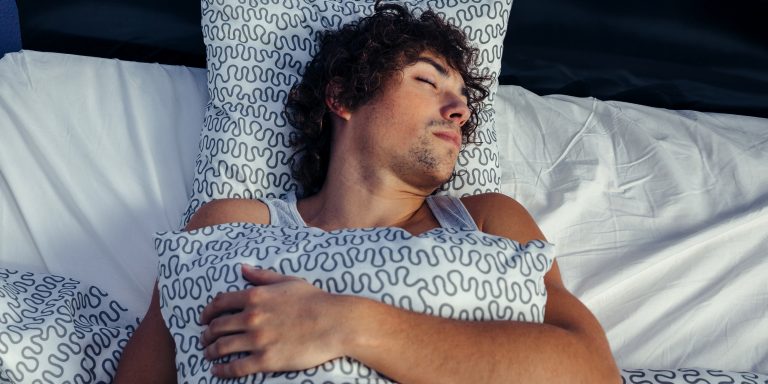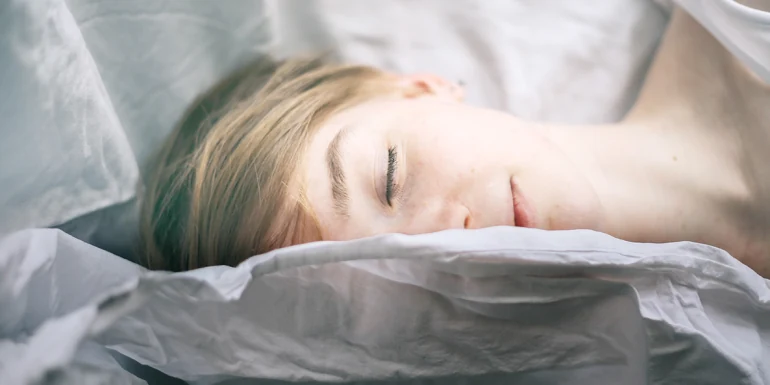
How melatonin affects our sleep
The effect of the hormone melatonin determines our sleep. But how does it control the processes in our body? How can we influence our sleep pattern? And why is sleep so important?
The fact that we can enjoy a good and relaxing sleep is thanks to the hormone with the gentle name, melatonin. As the effect of this messenger substance is similar to that of a sleep remedy, it is also referred to as the sleep hormone.
In darkness, our body produces the hormone in the pineal gland. This is located in our diencephalon above the mesencephalon. It is hardly any bigger than a pea. The hormone melatonin, which the pineal gland produces from the hormone serotonin, is released into the blood and makes us sleepy.
Restful sleep regenerates body and mind and improves performance. The key functions:
- Repair: cells renew themselves, muscles grow, and protein and new blood are created.
- Detox: during sleep, the body breaks down harmful substances produced by metabolic processes. If we sleep little or very poorly, this can damage the nerve cells in our brains.
- Boosting the immune system: during this phase, the immune system releases particularly large quantities of immunoactive substances.
- Improving cognition: the brain sorts out what we experienced and learned during the day. Important information makes its way into long-term memory. Creative solutions emerge.
The sleep hormone: its release and effect
In general, the messenger substance begins to be distributed between 7.30 p.m. and 9.30 p.m. It then increases rapidly. The effect: you suddenly feel tired. In a healthy body, melatonin levels remain heightened during the course of the night. Generally speaking, levels reach their highest between 1 a.m. and 3 a.m. This can vary depending on the season, however.
When it becomes lighter again the following morning, the production of melatonin is reduced and we gently wake from our sleep. The melatonin levels in our blood, which decline during the morning hours, are hardly measurable any more at around 9 a.m. As a rule, they remain at this low level throughout the day. In winter, when daylight is in short supply, it may also increase slightly in the daytime. Possible consequences: tiredness or even depression.
Tips for improved sleep
There are various means and ways to promote more peaceful sleep during the night. The three below help to stabilise your sleep-wake rhythm as follows:
Each person has their own biorhythm. It is therefore important to get used to a regular sleep-wake cycle and go to bed relaxed. Only this way will you feel rested in the morning. Rituals or regular exercises can have a calming effect, for example relaxation techniques like autogenic training, progressive muscle relaxation or simple breathing exercises. A relaxation tea or scents such as vanilla and lavender also help.
As darkness and light promote and inhibit melatonin production, respectively, you can shift your sleeping pattern by adjusting light levels. For example, light during the early morning serves to suppress the production of the messenger substance. You then wake up earlier but are also tired again at an earlier time the following evening. Light in the evening, on the other hand, pushes your sleep pattern back: you go to bed later but also sleep longer in the morning.
Bananas are rich in L-tryptophan, an amino acid that the body converts into the sleep hormone melatonin. Those who struggle to get a relaxing night’s sleep can therefore simply try out bananas as a solution.
Countering sleep problems
Many people suffer from sleep problems. Older people, in particular, are affected as the body produces less and less melatonin in old age. It is for this reason that the average time we sleep falls as we grow older.
Problems with sleep also affect people who often travel to countries in different time zones and suffer from jet lag, as well as people who work shifts. They can be helped, for example, by taking synthetic supplements of the sleep hormone. Please consult your doctor about this.
Sleep as a means of countering free radicals
Clinical studies have shown that the hormone is the body’s strongest own antioxidant. It can prevent the undesired effect of free radicals that emerge as a result of nicotine, alcohol or harmful environmental influences. The hormone binds to them, making them harmless. Following this process, they are excreted by the body.
Good for the immune system
The processes in our body take place according to the so-called circadian rhythm. This corresponds to a period of around 24 hours. A consequence of this is, among other things, our sleep-wake rhythm. Our biorhythm, which is specified by our internal body clock, controls processes within the body. This includes body temperature, the stress hormone cortisol as well as the hormone melatonin. The latter is not only important for a good sleep. In particular, it helps the body to regenerate. The messenger substance protects the cells, especially the sensitive nucleus, and thus strengthens the immune system.
Natural anti-ageing
If the production of melatonin is too weak, this automatically gives rise to increased attacks by free radicals. This speeds up our body’s aging process. In order to combat signs of aging, we therefore need to take good care to ensure that we get enough sleep. If our sleep is disrupted, it is thus important to re-establish our normal sleep pattern as quickly as possible.

Daniela Janssen (lic. Phil. somnologist and psychotherapist FSP) is a member of the Specialist Somnology Team at the Zentrum für Schlafmedizin Hirslanden Zürich (centre of somnology). She advises adults, young people and children with sleeping disorders. As a psychotherapist, she also works in her own practice. Daniela Janssen was available to the editorial team in an advisory and editorial capacity for this article.


Newsletter
Find out more about current health issues every month and get all the information you need about our attractive offers from all Helsana Group companies * delivered by e-mail to read whenever it suits you. Our newsletter is free of charge and you can sign up here:
We did not receive your information. Please try again later.
* The Helsana Group comprises Helsana Insurance Company Ltd, Helsana Supplementary Insurances Ltd and Helsana Accidents Ltd.